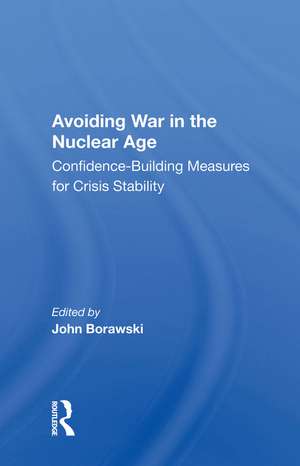Avoiding War in the Nuclear Age: Confidence-Building Measures for Crisis Stability
Autor John Borawskien Limba Engleză Hardback – 22 iul 2019
Preț: 764.20 lei
Preț vechi: 1102.79 lei
-31% Nou
Puncte Express: 1146
Preț estimativ în valută:
146.23€ • 156.37$ • 121.92£
146.23€ • 156.37$ • 121.92£
Carte tipărită la comandă
Livrare economică 18 aprilie-02 mai
Preluare comenzi: 021 569.72.76
Specificații
ISBN-13: 9780367008680
ISBN-10: 0367008688
Pagini: 250
Dimensiuni: 152 x 229 mm
Greutate: 0.45 kg
Ediția:1
Editura: Taylor & Francis
Colecția Routledge
Locul publicării:Oxford, United Kingdom
ISBN-10: 0367008688
Pagini: 250
Dimensiuni: 152 x 229 mm
Greutate: 0.45 kg
Ediția:1
Editura: Taylor & Francis
Colecția Routledge
Locul publicării:Oxford, United Kingdom
Cuprins
Foreword -- Preface -- Introduction -- Overview -- The World of CBMs -- Foundations -- The Hotline -- The Accidents Measures Agreement -- Avoiding Incidents at Sea -- The Stockholm CDE Negotiations -- CBMs in the U.N. Setting -- Soviet Views of CBMs -- Futures -- Beyond the Hotline: Controlling a Nuclear Crisis -- CBMs for Stabilizing the Strategic Nuclear Competition -- Risk Reduction and Crisis Prevention -- An East-West Center for Military Cooperation -- The Limits of Confidence -- Conclusion -- Conclusion -- Appendix: A CBM Handbook
Descriere
Given the disappointing history of arms control negotiations and agreements, disconcerting trends in the balance of power, and emerging technologies that challenge conventional assumptions about deterrence, new ways to promote security through negotiations must be identified and utilized if arms control is ever to play an integral role in enhancing deterrence and reducing instabilities. Confidence-building measures (CBMs) may offer one way out of the contemporary arms control morass. Instead of focusing on limiting the number and types of weaponry, CBMs are designed to control how, when, where, and why military activities occur. By clarifying military intentions and regulating the operations of military forces in times of both crisis and calm, CBMs can help diminish the opportunities for war arising from surprise attack or from miscalculation, accident, or failure of communication. This volume assembles leading CBM experts from government and academia to assess the utility of CBMs in a wide variety of areas. It is intended to serve as a basic primer on the subject, as well as to contribute to the ongoing national debate over the role of arms control in strengthening national security by analyzing new and fruitful avenues toward that over-riding objective.
